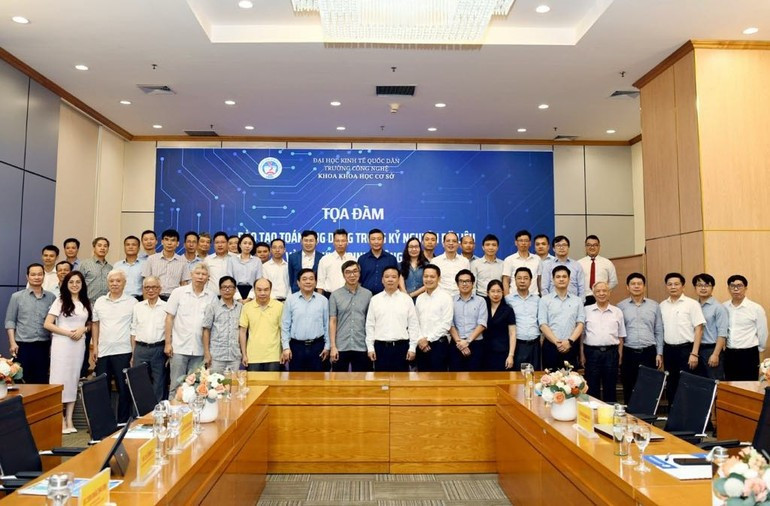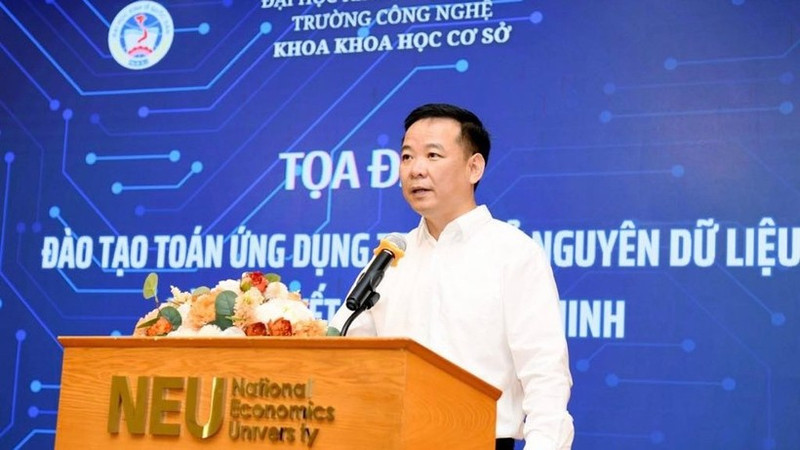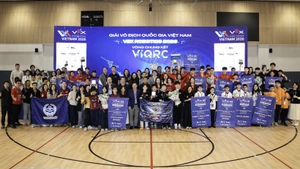From product recommendation algorithms on e-commerce platforms, increasingly accurate weather forecasting models, to self-driving cars, virtual assistants, and medical diagnostic tools, technology is present everywhere, continuously creating revolutionary changes in learning, labour, communication and societal operations and decision-making.
Behind those breakthrough technologies are complex algorithmic systems, large-scale data analysis models and sophisticated optimisation methods. Quietly but persistently, applied mathematics forms the foundation, creating, nurturing and leading every technological achievement, thereby driving advances that reshape industries worldwide.
Applied mathematics is a scientific field that uses mathematical theories, methods and tools to study, analyse and solve problems arising in practical fields including science, engineering, economics, and finance. Thanks to this characteristic, applied mathematics is central to the quantitative sciences and serves as a vital bridge between theoretical mathematics and real-world applications.
Role of applied mathematics in the era of data and AI
In the era of data and artificial intelligence, the explosion of information, unprecedented computational speed together with modern data processing techniques have made data-driven decision-making a core competency across fields. In the past, decisions relied mainly on experience; today they are increasingly shaped by data analysis, mathematical models, and optimisation algorithms.
Under the impact of big data and advances in AI, many sectors including economics, finance, manufacturing, business, engineering, biomedicine, public administration, security, and defence are undergoing strong transformations in their approaches and decision-making processes.
Data analysis, modelling and algorithm application are increasingly asserting their role as a core foundation, shaping effective decision-making methods in all areas. AI, machine learning, simulation and advanced computational algorithms all require a solid mathematical basis to operate accurately, effectively and responsibly.
In that context, applied mathematics is not only a fundamental subject but has become an important scientific pillar. It helps humans understand and model a complex world, transforming data into knowledge, knowledge into action, and action into practical value for society.
Beyond the role of a basic scientific sector, applied mathematics has become a “common language” for decoding data complexity, modelling multidimensional systems, and providing scientific bases for intelligent and quantitative decision-making. This role is increasingly expanding as the world becomes more dependent on data and intelligent systems.

Demand for human resources and position of applied mathematics experts
As the “operating language” of the knowledge economy, as well as a bridge between scientific thinking and practical action, applied mathematics is increasingly recognised as a “silent hero” driving innovation and growth in almost every field of the digital economy.
Over the past decade, the demand for applied mathematics human resources has increased strongly worldwide, particularly in high-tech, finance, healthcare, and logistics. The World Economic Forum’s 2023 report shows that eight out of ten skills projected to be most in demand in the coming years are directly related to data modelling, analysis and processing competencies — the core skills of applied mathematics. Positions such as Data Scientist, Quantitative Analyst, Operations Researcher, AI Engineer, and Risk Modeller consistently rank among the fastest-growing professions.
International organisations and global businesses are actively seeking personnel with solid mathematical foundations combined with programming skills, data analysis and modelling thinking. Notably, this demand is not only limited to traditional sectors but extends into many new fields such as biomedicine, high-tech agriculture, environment, smart logistics and public policy planning.
Demand for applied mathematics human resources in Viet Nam
In Viet Nam, the demand for applied mathematics personnel mirrors global trends amid the rapid development of the digital economy. According to estimates by the Ministry of Labour, demand for personnel in areas such as data analysis, AI and modelling is increasing by 25 - 30% annually, while supply only meets about 40 - 50%.
This has led to rising demand for personnel with quantitative skills and data analysis capacity in many sectors, with common positions including data analyst, risk management expert, business analyst, modelling engineer, and supply chain optimisation specialist.
Digital banking, insurance, fintech, market analysis, logistics, smart manufacturing, digital healthcare and other sectors are facing an urgent shortage of personnel with competencies in modelling, optimisation and risk analysis, but the supply of qualified candidates remains limited.
Despite the great demand, the main weakness of the Vietnamese labour market today is the severe shortage of candidates who have a comprehensive combination of solid mathematical foundations, modern technological skills and the ability to solve practical problems.
In the context of the digital economy, big data and AI shaping every sector, the demand for personnel with expertise in applied mathematics is increasing rapidly.
Applied mathematics experts are those who can build and analyse models (transforming practical problems into mathematical language); process and analyse data (using statistical tools and algorithms to extract valuable knowledge); develop algorithms (creating intelligent solutions for optimisation, forecasting and classification problems).
The combination of mathematics, technology and practical understanding makes them a “golden link” across sectors including business, finance, healthcare, smart manufacturing, and social management.
The National Economics University (NEU) has recognised the great potential and is developing an applied mathematics training programme, modern, interdisciplinary, application-oriented, market-driven, and internationally oriented. The programme is designed flexibly, allowing students to choose specialised orientations in line with their interests and career goals. The programme not only provides a solid mathematical foundation, but also emphasises the ability to apply mathematics in solving diverse problems.
The programme’s highlight is the harmonious combination of core mathematical knowledge: algebra, calculus, probability, statistics, optimisation, and modelling; modern technological skills: machine learning, big data analytics, simulation; and interdisciplinary application capabilities.
It is hoped that this discipline will train a new generation of “applied mathematicians”, who possess solid theoretical knowledge and be skilled in tools, ready to solve practical problems in many fields, with a responsible spirit and ethical standard in the data era. They will be the “silent architects”, building smart systems, creating effective solutions, contributing to societal development and strengthening national intellectual capacity for decades to come.
If you are a student who loves mathematics and wishes to apply it to solve practical problems, you should learn about applied mathematics. This discipline opens broad career opportunities in the era of data and AI, while contributing to an intelligent and sustainable society.
















